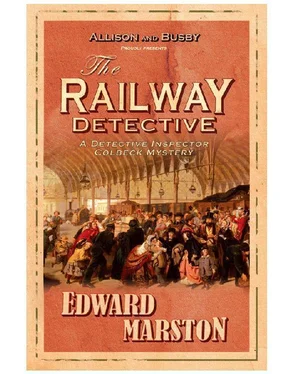Edward Marston - The Railway Detective
Здесь есть возможность читать онлайн «Edward Marston - The Railway Detective» весь текст электронной книги совершенно бесплатно (целиком полную версию без сокращений). В некоторых случаях можно слушать аудио, скачать через торрент в формате fb2 и присутствует краткое содержание. Жанр: Классический детектив, Исторический детектив, на английском языке. Описание произведения, (предисловие) а так же отзывы посетителей доступны на портале библиотеки ЛибКат.
- Название:The Railway Detective
- Автор:
- Жанр:
- Год:неизвестен
- ISBN:нет данных
- Рейтинг книги:4 / 5. Голосов: 1
-
Избранное:Добавить в избранное
- Отзывы:
-
Ваша оценка:
- 80
- 1
- 2
- 3
- 4
- 5
The Railway Detective: краткое содержание, описание и аннотация
Предлагаем к чтению аннотацию, описание, краткое содержание или предисловие (зависит от того, что написал сам автор книги «The Railway Detective»). Если вы не нашли необходимую информацию о книге — напишите в комментариях, мы постараемся отыскать её.
The Railway Detective — читать онлайн бесплатно полную книгу (весь текст) целиком
Ниже представлен текст книги, разбитый по страницам. Система сохранения места последней прочитанной страницы, позволяет с удобством читать онлайн бесплатно книгу «The Railway Detective», без необходимости каждый раз заново искать на чём Вы остановились. Поставьте закладку, и сможете в любой момент перейти на страницу, на которой закончили чтение.
Интервал:
Закладка:
‘Excuse me, Inspector,’ she said. ‘I was not expecting company.’
‘But you were expecting someone, Mrs Ings. I could tell that by the alacrity with which you opened the door. Did you think that I might be your husband?’
‘Yes.’
‘Does he not have a key to his own front door?’
‘Of course.’
‘Then why did you bolt it against him?’
She shook her head. ‘I don’t know.’
‘Perhaps you should sit down,’ he suggested, seeing her distress. ‘I’m sorry that I called at such an inopportune hour but I had no choice. It’s imperative that I speak to Mr Ings.’
‘Why?’ she asked, sitting down.
‘It’s a matter that relates to his work at the Post Office.’
‘Is he in trouble, Inspector?’
‘I’m not sure.’
‘What has he done?’
‘Well,’ he replied, taking the chair opposite her, ‘Mr Ings failed to report for work this week. He sent word to say that he was sick.’
‘But there’s nothing wrong with him.’
‘So why did he lie to his employers?’
Maud Ings bit her lip. ‘William has never let them down before,’ she said with vestigial affection for her husband. ‘He works long hours at the Post Office. They don’t appreciate what he does.’ She gave a shrug. ‘It may be that he is unwell. That’s the only thing that would keep him away. The truth is that I haven’t seen him this week.’
‘And why is that, Mrs Ings?’
‘My husband is…staying elsewhere.’
‘Do you have an address for him?’
‘No,’ she said, bitterly, ‘and I don’t really want it.’
Colbeck took a swift inventory of the room then looked at her more closely. Maud Ings was evidently a woman who was at the end of her tether. Apparently abandoned by her husband, she was still hoping that he might come back to her even though he had caused her obvious suffering. The remains of her youthful prettiness were all but obscured now. Colbeck treated her with great sympathy.
‘I regret that I have to ask you about your private life,’ he said, ‘but it’s germane to my investigation. Mrs Ings, it’s not difficult to see that you and your husband were short of money.’
‘I did my best,’ she said, defensively. ‘I always managed on what he gave me, however little it was.’
‘Yet Mr Ings earned a reasonable wage at the Post Office.’
‘Earned it and threw it away, Inspector.’
‘Was he a drinking man?’
‘No,’ she replied, as another flicker of affection showed, ‘William was no drunkard. I can clear him of that charge. He was a good man at heart — kind and considerate.’ Her voice darkened. ‘At least, he was for a time. That was before he caught the disease.’
‘What disease?’
‘Gambling. It ruined our marriage, Inspector.’
‘I take it that he was not a successful gambler.’
‘Only now and then,’ she said, wistfully. ‘That was the trouble, sir. William had a run of luck at the start and he thought that it would last. He bought me a new coat with his winnings and some lovely furniture.’ She shook her head sadly. ‘Then his luck changed. We had to sell the furniture last month.’
‘Yet he still went on gambling?’
‘Yes, Inspector.’
‘Do you know where he went to play cards?’
‘I do now,’ she said, vengefully. ‘I got it out of him in the end. I mean, I had a right to know. I’m his wife, Inspector. Sometimes, he’d be away all night at this place. I had a right to be told where it was.’
‘And where was it, Mrs Ings?’
‘Devil’s Acre.’
‘I see.’
Colbeck knew the area only too well. It was a favoured haunt of the criminal fraternity and notorious for its brothels and gambling dens. If her husband were a regular visitor to Devil’s Acre, then Maud Ings had been right to describe his addiction as a disease. No decent or sensible man would even dare to venture into such a hazardous district. Colbeck was seeing an aspect of William Ings that had been carefully hidden from his employer. Herbert Shipperley might believe that Ings had an unblemished character but the man consorted regularly with criminals around a card table.
Colbeck was certain that he had picked up a scent at last.
‘Is that where your husband is now?’ he asked. ‘Playing cards?’
‘Probably.’
‘Can you be a little more precise, Mrs Ings?’
‘No,’ she replied. ‘He wouldn’t tell me exactly where he went in case I tried to follow him there. And I would have, Inspector,’ she went on with an edge of desperation. ‘William left us with no money.’
‘He left you with a roof over your head.’
‘That’s true, Inspector. I’ve still got a home for myself and the children. It’s one consolation. And he did promise that he’d send me something when the money came through.’
‘From his wages, you mean?’
‘Well, I don’t think it would be from his winnings at a card table,’ she said, ‘because he always seemed to lose.’ She peered at Colbeck. ‘Why are you so interested in my husband? I still don’t understand why you came here looking for him.’
‘Earlier today,’ he explained, ‘there was a train robbery.’
‘He’d never get involved in anything like that,’ she protested.
‘Not directly, perhaps, but the mail train that was ambushed was carrying a consignment of money. Mr Ings was one of the few men who knew that the money would be in transit today.’
‘That doesn’t mean he betrayed the secret.’
‘No,’ he conceded, ‘and it may well be that your husband is completely innocent. What I need to do is to establish that innocence as soon as is possible so that we can eliminate him from our inquiries. Now,’ he said, softly, ‘I realise that this is a difficult time for you but I must press you on the matter of his whereabouts.’
‘I told you, Inspector. I don’t know where he is.’
‘You must have some idea, Mrs Ings.’
‘None at all.’
‘When did he leave?’
‘Last weekend.’
‘Did he offer you no explanation?’
‘William simply packed a bag and walked out of the house.’
‘He must have had somewhere to go to,’ insisted Colbeck, watching her carefully. ‘Somewhere — or someone.’
Her cheeks reddened. ‘I don’t know what you mean, Inspector.’
‘I think that you do.’
‘William is not that sort of man.’
‘Your husband is a trusted employee at the Post Office,’ he told her, calmly, ‘a man with access to important information. On the eve of a serious crime that may be linked to his place of work, Mr Ings not only pleads illness and stays away, he leaves his wife and children to fend for themselves while he goes elsewhere.’ He fixed her with a piercing stare. ‘I think that we have rather more than a curious coincidence here, Mrs Ings. Don’t you?’
Maud Ings was in a quandary. Wanting to protect her husband, she was deeply hurt by his treatment of her. Refusing to accept that he could be involved in a crime, she came to see that the evidence was pointing against him. She wrestled with her conscience for a long time but Colbeck did not rush her, recognising that her situation was already exerting almost unbearable pressure upon the woman. She was the discarded wife of a man who might turn out to be involved in a major crime. It took time for her to adjust to the full horror of her predicament.
Eventually, she capitulated and gabbled the information.
‘I don’t know the woman’s name,’ she said with rancour, ‘but I think that she lives in the Devil’s Acre.’
CHAPTER FOUR
Superintendent Edward Tallis was just finishing another cigar when there was a knock on the door of his office. It was late but he rarely left his desk before ten o’clock at night, believing that long hours and continual vigilance were required to police a city as large and volatile as London. He cleared his throat noisily.
Читать дальшеИнтервал:
Закладка:
Похожие книги на «The Railway Detective»
Представляем Вашему вниманию похожие книги на «The Railway Detective» списком для выбора. Мы отобрали схожую по названию и смыслу литературу в надежде предоставить читателям больше вариантов отыскать новые, интересные, ещё непрочитанные произведения.
Обсуждение, отзывы о книге «The Railway Detective» и просто собственные мнения читателей. Оставьте ваши комментарии, напишите, что Вы думаете о произведении, его смысле или главных героях. Укажите что конкретно понравилось, а что нет, и почему Вы так считаете.












